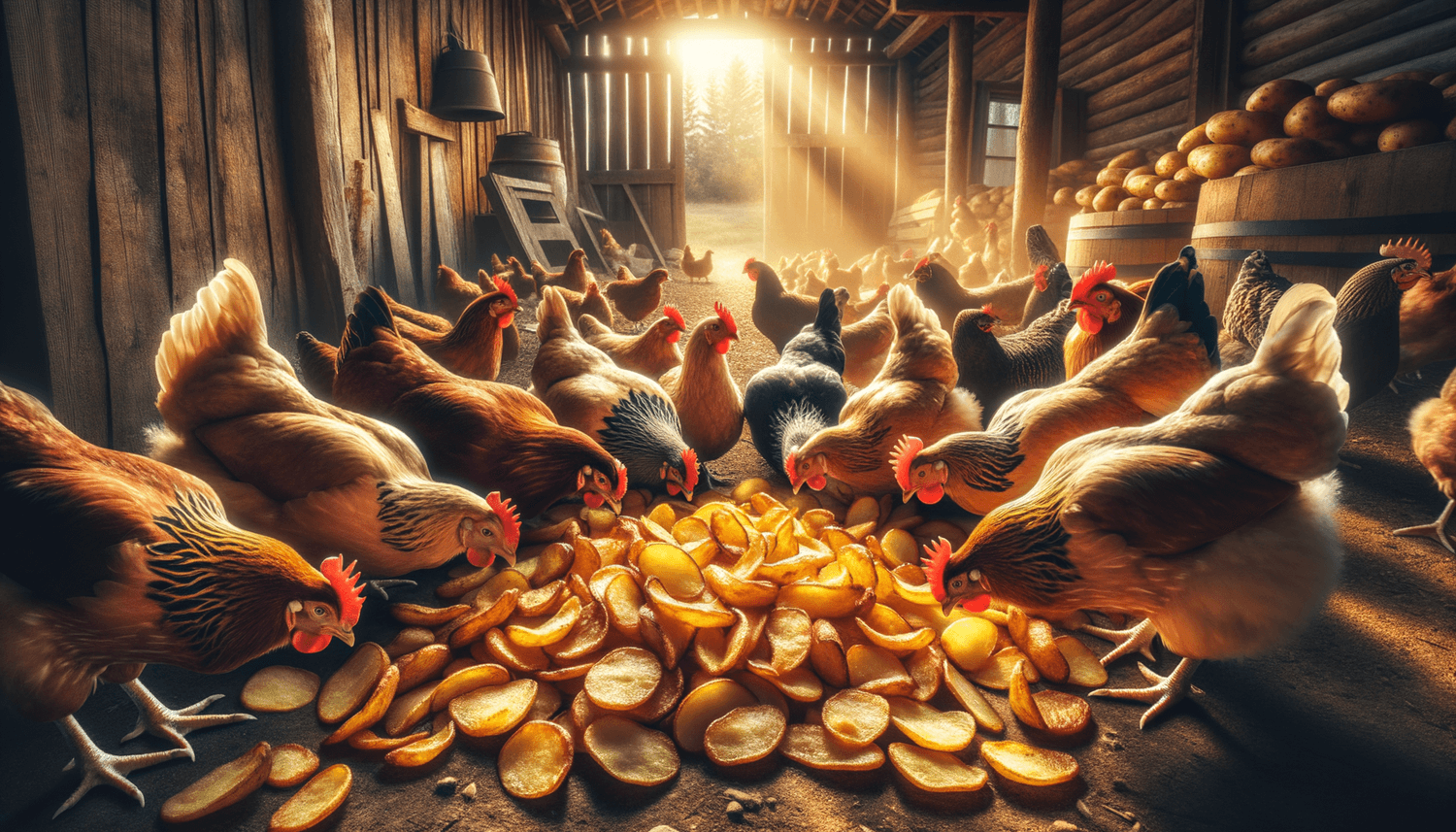Hey there, fellow poultry enthusiasts! We’re about to explore “the peel deal” with our feathery friends in the backyard – that’s right, we’re talking about cooked potato skins! Can your clucky companions safely nibble on these tasty kitchen scraps or is it a potato taboo? Fear not, we’ll be dishing out all the scoops on this spud-tastic topic, including the importance of a well-balanced diet, the nutritional value, potential benefits and risks, and tips on how to prepare cooked potato skins for your cherished little egg-layers. Get ready to feel ‘poultry-rific’ as you become a true couch potato…errr, coop potato expert! 🐔
Can chickens eat cooked potato skins?
Yes, chickens can eat cooked potato skins, and it is generally safe for them. However, moderation is key as potato skins alone don’t provide all necessary nutrients needed for a balanced chicken diet. Be sure to eliminate any green parts or sprouts on the potato skin before feeding, as these may contain solanine, which can be toxic to chickens.
Chickens need a balanced diet too
Just like us humans, chickens thrive when they receive a well-rounded and balanced diet. To keep your feathered friends happy and healthy, their dietary needs must be met with the right combination of quality food sources. A chicken’s diet should primarily consist of a high-quality chicken feed, which serves as their main source of essential nutrients. In fact, chicken feed should make up around 80-90% of their overall diet to ensure optimal health and productivity.
Aside from chicken feed, it’s also important to offer a variety of treats to make up the remaining 10-20% of their diet. These treats can include fruits and vegetables like cooked potato skins, which not only provide additional nutrients, but also serve as a fun and engaging activity for your feathered flock. Remember, moderation is key in maintaining an overall balanced diet, so mix up those treats to keep your chickens happy and healthy!
Nutritional value of cooked potato skins for chickens.
Cooked potato skins can indeed offer some nutritional value to chickens when fed in moderation. These starchy vegetables are packed with essential vitamins and minerals that contribute to the well-being of your feathered friends. One of the primary benefits of cooked potato skins is their rich content of vitamin C, which is crucial for a healthy immune system and overall good health.
Additionally, cooked potato skins contain significant amounts of potassium, an essential mineral that helps regulate fluid balance, muscle contractions, and nerve signals in chickens. Other vital nutrients found in these tasty treats include magnesium and phosphorus, both of which play important roles in bone health and metabolism. Beyond these vitamins and minerals, cooked potato skins also provide a good amount of hydration, which can be especially beneficial during hot summer months when your chickens may need an extra boost of fluid intake.
Lastly, the fiber content in cooked potato skins can aid in healthy digestion and provide bulk to the chicken’s diet, which helps keep them satisfied between meals. While cooked potato skins should not be the primary food source for your chickens, they can certainly add valuable nutrients and variety to their diet when offered in moderation.
Nutrition table of cooked potato skins for chickens.
| Information | Description |
|---|---|
| Nutritional Value | Rich in vitamin C, potassium, magnesium, and phosphorus |
| Suggested Serving Size | A few small pieces per chicken, offered occasionally |
| Safe Feeding Practices | Remove green parts or sprouts, avoid excessive amounts |
| Preparation | Thoroughly cook, cool, and cut into small pieces |
| Potential Risks | Solanine in green parts, choking hazard if large pieces |
| Hydration | Provides additional fluids for chickens |
| Digestion | Fiber content aids in healthy digestion |
| Seasonal Availability | Available year-round, depending on location |
| Other Benefits | Enhances variety in diet and provides engagement |
Preparing cooked potato skins for chickens
Before you offer cooked potato skins to your chickens, you’ll want to ensure proper preparation so your feathered friends can safely enjoy this treat. First, wash and scrub the potatoes thoroughly to remove any dirt or debris. When cooking the potatoes, be sure to cook them well to break down any potential anti-nutrients, such as trypsin inhibitors, that could interfere with protein digestion in chickens.
After cooking, allow the potatoes to cool completely before cutting them into small, manageable pieces for your chickens. This will not only make it easier for them to eat but also reduce the risk of choking. Remember to remove any green parts or sprouts from the potato skin, as these contain solanine, which can be toxic to chickens.
Alternatives to cooked potato skins
If you’re keen on providing your chickens with a variety of treats, there are many other options aside from cooked potato skins. Some healthy and nutritious alternatives include leafy greens (such as kale, spinach, and lettuce), fruits (such as berries, melons, and apples), and other vegetables (such as carrots, squash, and peas). Be sure to research each item to determine its nutritional value, proper preparation, and feeding guidelines for chickens.
Takeaway
All in all, cooked potato skins can be a delicious and nutritious treat for your backyard chickens when fed in moderation. By providing a balanced diet, safe feeding practices, and a variety of treats, you can be confident that your chickens are enjoying their journey from the coop to the table. Always be mindful of potential risks, and ensure proper preparation to keep your chickens healthy and happy!

















